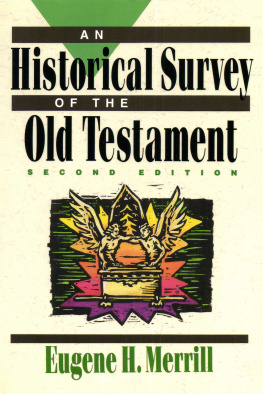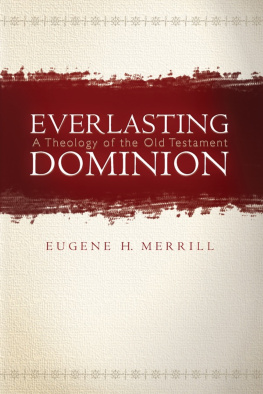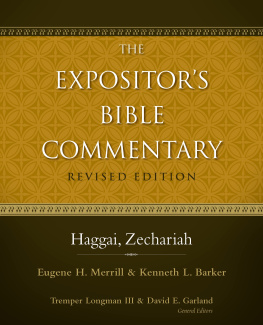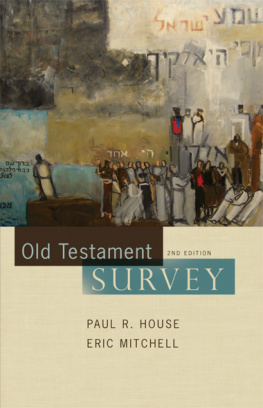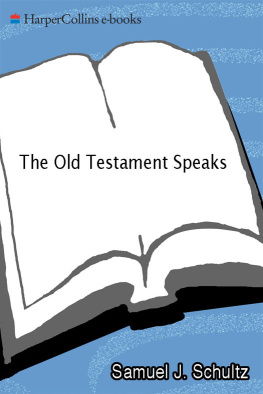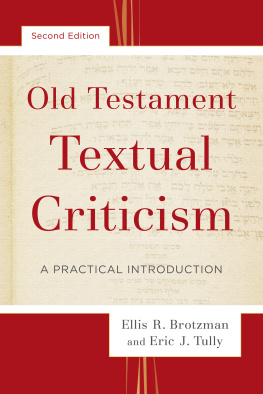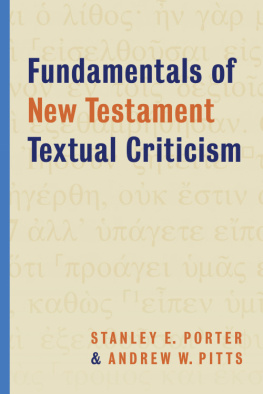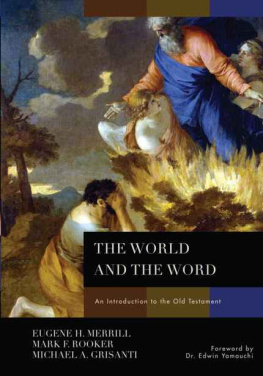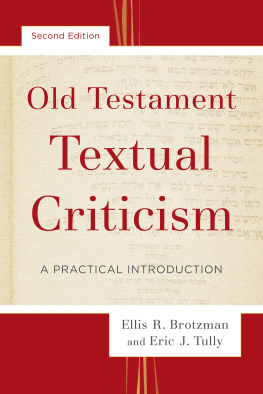
1991 by Baker Books
Published by Baker Academic
a division of Baker Publishing Group
P.O. Box 6287, Grand Rapids, MI 49516-6287
www.bakeracademic.com
Ebook edition created 2014
All rights reserved. No part of this publication may be reproduced, stored in a retrieval system, or transmitted in any form or by any meansfor example, electronic, photocopy, recordingwithout the prior written permission of the publisher. The only exception is brief quotations in printed reviews.
Library of Congress Cataloging-in-Publication Data is on file at the Library of Congress, Washington, DC.
ISBN 978-1-58558-373-7
Contents
Preface
T he passing of twenty-five years has not essentially altered the premises and concerns that underlay the initial publication of An Historical Survey of the Old Testament in 1966. That it passed through fifteen printings over the years also testifies to the ongoing need for a work like this, one that adheres uncompromisingly to the Old Testament as inerrant Scripture and yet, in a clear and fair manner, addresses the difficult issues raised by contemporary biblical scholarship.
Neither time nor knowledge has stood still in a quarter of a century, however, so the time has come for a complete revision of the original work. Former students, colleagues, and the publisher have insisted that the project be undertaken, especially since the fundamental need of undergraduate teachers and their students remains the same as ever: an up-to-date, scholarly, and clearly written exposition and defense of the Old Testament as an historical record of the Word of God. The basic approach in this revision is identical to that of the original edition, but certain sections are rewritten in light of fresh discovery and new insights. Issues dominant in 1966 seem now not so important, but new ones have arisen, issues that could scarely have been anticipated then. Hence, the present work eliminates some old material and adds some new, making the volume familiar to earlier readers but renewed in its credibility and usefulness by virtue of its contemporaneity.
The author expresses special gratitude to friends and family for their continued encouragement to set about this task. His wife, Janet, prepared the test bank. He stands deeply in debt to Mrs. Linda Worrell, who with unbounded patience and enthusiasm undertook the word processing as if it were her own project. In particular, he dedicates the final result to the finest model of collegiality he has ever experienced, the faculty of Old Testament studies of Dallas Theological Seminary: Dick Averbeck, Bob Chisholm, Don Glenn, Mark Rooker, and Rick Taylor.
Preface to the First Edition
H aving taught beginning Old Testament courses for a number of years, the author has felt the need for some time for a text that would meet some needs that were not being met by other books in the field. Being firmly committed to the conservative school of thought, he has had to forgo works that, because of their critical historical and theological biases, were deemed inappropriate for the conservative freshman or sophomore student who is in the rudimentary stages of his Old Testament study. And yet many of the conservative books either have not had the depth of scholarship necessary for a college approach or have gone beyond the ability of the beginning student in their details and presuppositions. Moreover, many of them are restricted to too narrow an approach, such as an emphasis on content, historical background, doctrine, or other specific areas.
Since this study approaches the Old Testament as an historical record of Gods revelation to the world through Israel, the historical structure of the Old Testament has been the basic framework. To this has been added information from the ancient Near Eastern world in which biblical history took place, including discussions of geographical, historical, and archaeological matters that illuminate the biblical story. Because of current criticisms of the reliability of the Old Testament in its scientific statements, special attention has been paid to this aspect of the record.
Every effort has been made to eliminate paraphrases of the narrative sections of the Old Testament, but naturally some retelling has been necessary in order to maintain coherence and smoothness. In those areas of the Scripture where the account does not speak so clearly of itself the present work provides special attention. It is hoped that the student will study this volume as an ancillary to the Word of God, an aid to its better understanding.
The author hereby expresses much-deserved recognition to those who have contributed long hours in seeing this most enjoyable project to completion. First, to his wife, Janet, who typed the entire final draft and offered unending encouragement and inspiration, a special thanks is due. And warm appreciation is gladly given to Miss Pen Cansler of the Bob Jones University English department who offered invaluable suggestions concerning mechanics and style.
Finally, the generous help and support of many of his students, particularly Mr. William Alford, must not go unrecognized. It is with a sincere prayer that this effort may create a love for the Old Testament as the inspired Word of God that this book is made available.
Foundations for Study of the Old Testament
T he fullest understanding of any book depends in part on knowledge of its author, purpose, and overall theme. It helps to have this knowledge before reading a book in its entirety.
This is particularly true of the Old Testament, for the uniqueness of its authorship and contents renders it especially vulnerable to misunderstanding. Many of the literary criteria applied to other works are simply not sufficient to make plain the true nature of this most important composition. For example, how many books consist in turn of thirty-nine separate books, written over a period of one thousand years by perhaps forty writers? How many claim dogmatically to be special revelation from God? How many speak of a people whose entire complex history is interwoven with miraculous, divine intervention, a history whose fundamental purpose is to provide not mere information but truth? In short, any book that has survived for well over two thousand years and has, more than any other literature, revolutionized the course of human history must be approached with more than usual care. It must be addressed with full consideration of its importance as literature, to say nothing of its character as the Word of God. Thus, the study of the Old Testament must be preceded by a review of the introductory materials essential to an intelligent and thorough appreciation of its nature and content.
T ABLE 1
The Books of the Old Testament
| Hebrew Arrangement | Protestant Arrangement |
Torah | Pentateuch |
Genesis | Genesis |
Exodus | Exodus |
Leviticus | Leviticus |
Numbers | Numbers |
Deuteronomy | Deuteronomy |
Nebiim | History |
Joshua | Joshua |
Judges (and Ruth) | Judges |
Samuel | Ruth |
Kings | 1 Samuel |
Isaiah | 2 Samuel |
Jeremiah (and Lamentations) | 1 Kings |
|
Next page
